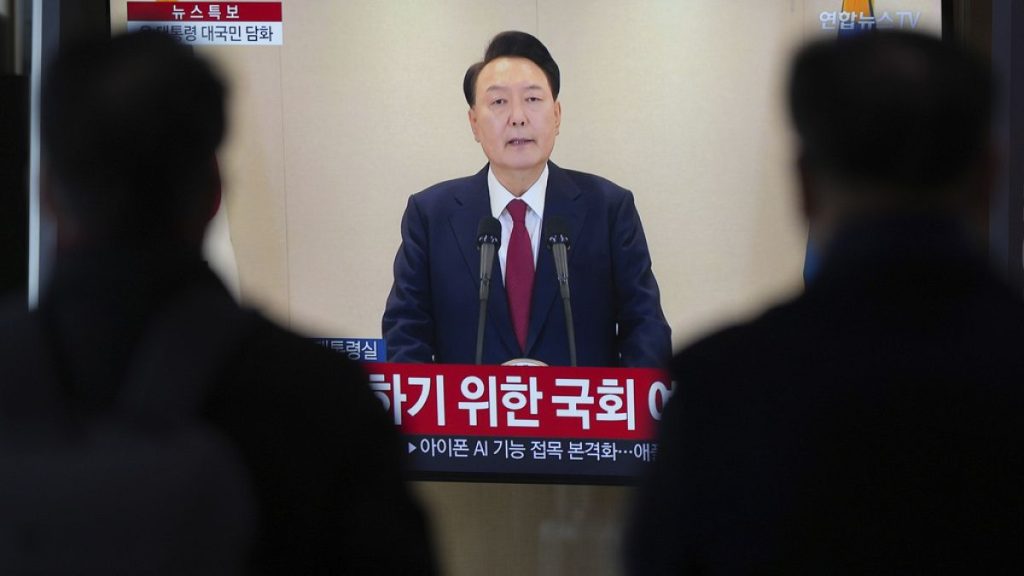Paragraph 1: The Impeachment Crisis and Martial Law Decree
South Korean President Yoon Suk Yeol finds himself embroiled in a deepening political crisis, facing an impeachment motion from the opposition Democratic Party following his controversial declaration of martial law on December 3rd. This unprecedented move, the first in over four decades, sparked widespread protests and calls for his resignation, further exacerbating the already tense political climate. The martial law decree saw hundreds of armed troops deployed around the National Assembly and a raid on the election commission, actions that, while not resulting in significant violence, raised serious concerns about democratic processes and the potential for executive overreach. Yoon’s subsequent withdrawal of the decree after just six hours did little to quell the ensuing political firestorm.
Paragraph 2: Yoon’s Defense and Accusations Against the Opposition
In a televised address, President Yoon vehemently defended his actions, categorically rejecting the opposition’s impeachment attempts and any investigations into the martial law decree. He framed the declaration as a necessary act of governance, intended to send a strong message to the Democratic Party, whom he accused of paralyzing state affairs and undermining the constitutional order. Yoon portrayed the opposition as an obstructionist force intent on disrupting the government’s functioning and sympathizing with North Korea. He went as far as labeling the Democratic Party a "monster" and "anti-state forces," alleging they repeatedly abused their legislative power to impeach officials, obstruct budget bills, and generally create chaos.
Paragraph 3: The "Knife Dance of Chaos" and the Question of Rebellion
Yoon directly addressed the opposition’s accusations that his martial law declaration constituted an act of rebellion, characterizing their claims as a "knife dance of chaos." He argued that the deployment of less than 300 soldiers to the National Assembly was intended to maintain order, not to dissolve or paralyze the legislature. He further asserted that the martial law decree was a legitimate act of governance, not subject to investigation and certainly not an act of rebellion. This stance marked a shift from his earlier apology for the decree, where he indicated a willingness to accept political and legal responsibility for his actions.
Paragraph 4: A Divided Nation and the Stakes of Impeachment
The political landscape in South Korea remains deeply divided, with the ruling party and the opposition locked in a bitter power struggle. Yoon’s forceful rhetoric and defiant stance against the impeachment effort further polarize the nation and heighten the stakes of the upcoming vote. The impeachment motion, if successful, would represent a significant blow to Yoon’s presidency and could potentially lead to early elections, further destabilizing the country. The outcome of the vote hinges on the support of lawmakers, with the ruling party’s previous boycott highlighting the difficulty in achieving the required two-thirds majority.
Paragraph 5: Implications for South Korean Democracy and Stability
The unfolding political crisis raises serious concerns about the future of South Korean democracy and the stability of the region. Yoon’s actions, while defended as necessary measures to maintain order, have been criticized by many as an overreach of executive power and a threat to democratic norms. The opposition’s relentless pursuit of impeachment, fueled by deep-seated political divisions, further exacerbates the tensions and risks further destabilizing the country. The situation calls for a cautious and measured approach from all parties involved to avoid further escalation and protect the integrity of democratic institutions.
Paragraph 6: The Need for Dialogue and Reconciliation
The current political impasse in South Korea underscores the urgent need for dialogue and reconciliation. A continued cycle of confrontation and escalating rhetoric will only serve to deepen the divisions and undermine the country’s ability to address pressing challenges. Finding common ground and working towards a resolution that respects democratic principles and addresses the concerns of all stakeholders is essential for restoring stability and ensuring the long-term health of South Korean democracy. The international community also plays a role in encouraging dialogue and supporting efforts to de-escalate the situation, promoting a peaceful and democratic resolution to the crisis.














